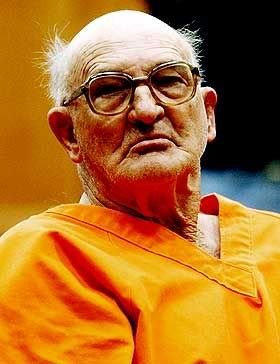GUILTY: ROT IN HELL

PHILADELPHIA, Mississippi (CNN) -- Forty-one years to the day three civil rights workers were ambushed and killed by a Ku Klux Klan mob, a jury found former Klansman Edgar Ray Killen guilty of all three counts of manslaughter Tuesday.
The "Freedom Summer" killings of James Chaney, 21, Andrew Goodman, 20, and Michael Schwerner, 24, galvanized the civil rights movement.
The jury of nine whites and three blacks reached the decision after several hours of deliberations.
Killen showed no emotion as the verdicts were read.
But as he was being escorted from the courthouse under heavy guard, the wheelchair-bound man took swipes at reporters' microphones and cameras. One of the reporters was black, as was a cameraman.
A date for Killen's sentencing will be set by Circuit Court Judge Marcus Gordon at 2 p.m. ET, a court official said. He faces a maximum sentence of 20 years per count, and a minimum of one year per count, Mississippi Attorney General James Hood said.
From her Manhattan home Goodman's mother, Carolyn Goodman, 89, told CNN she had waited a long time for a guilty verdict, but it was "nothing to be happy about."
"I'm just overcome. ... But you know I had a feeling it was going to happen," she said.
"I just hope he's off the streets," she said of Killen. "I don't want anything more terrible than that. I don't want anything violent. I'm against capital punishment."
In his closing argument Monday, Neshoba County District Attorney Mark Duncan implored the 12 jurors to "hold the defendant responsible for what he did."
"What you do today when you go into that jury room is going to echo throughout the history of Neshoba County from now on," Duncan said. "You can either change the history that Edgar Ray Killen and the Klan wrote for us, or you can confirm it."
"Find him guilty of murder," Duncan said. "That's the verdict that the state of Mississippi asks you to return."
He told the jury to think of Chaney, Goodman and Schwerner -- three young men who had volunteered to help register blacks to vote in the summer of 1964, an act "so despised it cost them their lives."
Chaney was a black man from Mississippi.
Goodman and Schwerner were white New Yorkers who came to the South with hundreds of other civil rights activists.
"Those three boys and their families were robbed of all the things that Edgar Ray Killen has been able to enjoy for the last 41 years. And the cause of it, the main instigator of it was Edgar Ray Killen and no one else," the district attorney said.
"He was the man who led these murders. He is the man who set the plan in motion. He is the man who recruited the people to carry out the plan. He is the man who directed those men into what to do."
Now 80, the balding, bespectacled Killen -- a former preacher -- appeared to be sleeping during much of the closing remarks.
Hood, who led the case, said he wished "some of my predecessors would have done their duty" by bringing charges against Killen. Noting that it was "not good politics to bring this case up," he said, politics and time should not get in the way of justice.
Hood said testimony showed Killen possessed "venom" at the time of the killings and still does.
"That venom is sitting right there. It is seething behind those glasses," he said. "That coward wants to hide behind this thing and put pressure on you."
Burden of proof
Seeking to undermine the prosecution's case, defense attorney Mitch Moran said "nothing in the record shows Edgar was there" during the ambush and killings.
"The '60s was a terrible era in a lot of ways. We do not need to relive them, and we do need to go forward," Moran said. "What I'm asking you to do is to look at this evidence and hold the state to the burden of proving this case beyond a reasonable doubt."
Another defense attorney, James McIntyre, said, "The burden of proof on this case does not reflect any guilt whatsoever."
"Mr. Edgar Ray Killen had nothing to do with it," he said.
On June 21, 1964, Chaney, Goodman and Schwerner were on their way to investigate the burning of a black church when they were briefly taken into custody for speeding.
According to testimony, the Klan had burned the church to lure the three men back to Neshoba County.
After they were released from the county jail in Philadelphia, Mississippi, a KKK mob tailed their car, forced if off the road, and shot them to death. Their bodies were buried in an earthen dam -- in a trench dug in anticipation of the killings, according to testimony.
In a 1967 federal trial an all-white jury deadlocked 11-1 in favor of convicting Killen. The lone holdout said she could not vote to convict a preacher.
Seven other men were convicted of conspiring to violate the civil rights of the victims. None served more than six years in prison.